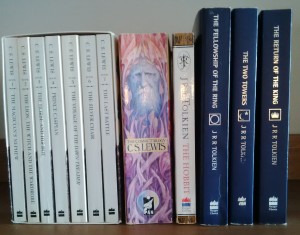“I’m afraid to say, but I must say it . . . I think m uch of [C.S.] Lewis’s attraction to the Protestant evangelical world lies in his individualism.”
uch of [C.S.] Lewis’s attraction to the Protestant evangelical world lies in his individualism.”
This assessment was offered by Ralph Wood, Professor of Theology and Literature at Baylor University, in a lecture delivered in Toronto in 2004 which compared the writings and sensibilities of C.S. Lewis and J.R.R. Tolkien. I had the opportunity to re-listen to the lecture this morning.
Towards the end of the lecture, Wood contrasted the profoundly individualistic outlook of Lewis with the deeply communitarian vision of Tolkien. In Lewis’s Cosmic Trilogy, Wood observes, the protagonist Ransom goes to Malacandra and then later Perelandra by himself. Furthermore, in The Narnia Chronicles each of the children come to face Aslan by him- or herself. On the other hand, the solitary individual is unimaginable for Tolkien. At the center of The Lord of the Rings trilogy is the Fellowship, which Wood describes as the “ultimate multicultural community” of “equal unlikes” united by a common mission. Even when the Fellowship breaks down, it does not result in heroic individuals going their own way, but in smaller communities and partnerships (ie. – Frodo and Sam, Merry and Pippin), which prove to be essential to the continuation of the quest.
Now some may be tempted to say that this difference in outlook between Lewis and Tolkien is simply the outworking of their church affiliations. Namely, Lewis was a Protestant and Tolkien a Roman Catholic. While there may be some truth to this in terms of contemporary North American expressions of Protestantism, historically this has not always been the case. As evidence, consider this quote from the Reformer John Calvin that I quite independently (or Calvin might say providentially) also came across this morning:
“But because it is now our intention to discuss the visible church, let us learn even from the simple title ‘mother’ how useful, indeed how necessary, it is that we should know her. For there is no other way to enter into life unless this mother conceive us in her womb, give us birth, nourish us at her breast, and lastly, unless she keep us under her care and guidance until, putting off mortal flesh, we become like the angels [Matt. 22:30]. Our weakness does not allow us to be dismissed from her school until we have been pupils all our lives. Furthermore, away from her bosom one cannot hope for any forgiveness of sins or any salvation, as Isaiah [Isa. 37:32] and Joel [Joel 2:32] testify” (John Calvin, Institutes of the Christian Religion, IV.i.4).
One thought on “An Interesting Juxtaposition”